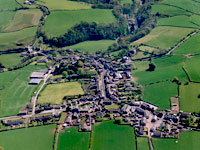Recent Stories
- Businesses urged to tap into science and technology young talent
- Digital relay baton enables remote crowd cheering of athletes
- Health Innovation Campus moves a step closer
- £7.1 million R&D boost for North West businesses
- Centre of excellence created for the next industrial revolution
- Artificial intelligence toolkit spots new child sexual abuse media online
- Strategic partnership set to help plug cyber security skills gap
- What your choice of smartphone says about you
- InfoLabTree: Discover the Story
- novi.digital Launch Event - 'An Event to Help Businesses Grow Online'
RSS Feeds
RSS feeds can deliver the latest InfoLab21 news and events direct to your browser without you having to visit the website.
In most browsers you can click on an RSS link and choose to subscribe to the feed to add it to your favourites or bookmarks.
Village life transformed with online network
Story supplied by LU Press Office
 The village of Wray in Lancashire
The village of Wray in Lancashire
Wray in Lancashire is the first village in the UK to benefit from wifi broadband in 2003 and was the first village to get high-speed broadband in 2010 - thanks to Lancaster University.
The Wray Broadband project has benefited a village of 500 people including around 100 businesses, ranging from a nuclear energy consultant to an occupational health company, interior designer, a writer for a New York magazine, and several artists.
Jennie Buckland is a homeworker, writing reports online for Guide Dogs for the Blind. She said: "This connection makes all the difference because I wouldn't be able to work away from home with small children and the speed of the connection makes it easy."
Her husband, a deputy headteacher, can also connect to the school website in the evening and do work online.
Among other villagers to benefit is a geologist in the oil extraction business holding desktop conferences; the village postmistress who can have Sundays off because by ordering online she no longer has to go to the cash-and-carry; and university students who would not stay in the village during vacations because they could not study online.
In an NWDA film, sculptors Maggie and Boris Haworth describe how they are able to send designs to clients in the US, schoolchildren do their homework online and connect with family abroad and the village has begun an online project to support an orphanage in Thailand.
The wifi connection has also prevented retired villagers from feeing isolated, as former farmer Barry Lindsay describes.
The project manager is Chris Conder whose family has farmed in Wray for four generations: "I got involved with the Wray project as a means of getting a broadband connection for myself, my husbands' farm business and my kids. The digital divide grows ever wider, with the rural population now severely disadvantaged by lack of access to modern methods of communication."
The project has enabled her to runs her own IT business from home but she says it has also enabled her family to stay in touch.
It was the first project to be developed by the RuralConnect Living Lab, an initiative co-ordinated by Dr Nicholas Race, Dr Keith Mitchell and Dr Johnathan Ishmael from the School of Computing and Communications at InfoLab21.
Other village projects using the wifi mesh include the Hermes project, a digital noticeboard in the post office for community photos
and a project called Locoblog which enables people to use mobile phones to publish photos to google maps. Locoblog shows you exactly where you were stood in the village when you took the shot. This was used to take photos of Wray's annual scarecrow festival.
The high-speed network is now being used by researchers to investigate how it is used as residents experience both live and on-demand television delivered using peer-to-peer. As a result of this project, other organisations, including the BBC, have become involved with the people of Wray as they look at the social implications and potentially life-changing impact that broadband has on individuals and small businesses.
Fri 17 June 2011
Associated Links
- School of Computing and Communications - a multi-million pound centre for study and research in the fields of computer science, ICT and communications engineering



